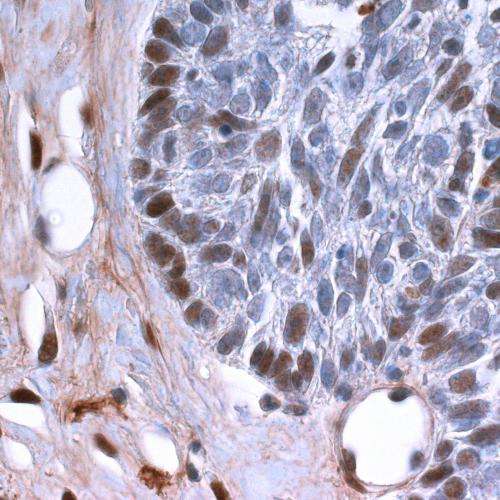New mechanism involved in skin cancer initiation, growth and progression

Squamous cell carcinoma (SCC) represents the second most frequent skin cancer with more than half million new patients affected every year in the world. Cancer stem cells (CSCs), a population of cancer cells that have been described in many different cancers including skin SCCs and that feed tumor growth, could be resistant to therapy, thus being responsible for tumor relapse after therapy. However, very little is yet known about the mechanisms that regulate CSCs functions.
In a new study featured on the cover of Cell Stem Cell, researchers led by Pr. Cédric Blanpain, MD/PhD, professor and WELBIO investigator at the IRIBHM, Université libre de Bruxelles, Belgium, report the mechanisms regulating the different functions of Twist1 controlling skin tumour initiation, cancer stem cell function and tumor progression.
Benjamin Beck and colleagues used state-of-the-art genetic mouse models to determine the functional role and molecular mechanisms by which Twist1 controls tumor initiation, cancer stem cell function and tumor progression. Collaborating researchers demonstrated that while Twist1 is not expressed in the normal skin, Twist1 deletion prevents skin cancer formation, demonstrating the essential role of Twist1 during tumorigenesis. "It was really surprising to observe the essential role of Twist1 at the earliest step of tumor formation, as Twist1 was thought to stimulate tumor progression and metastasis," says Benjamin Beck, the first author of this study.
The authors demonstrate that different levels of Twist1 are necessary for tumor initiation and progression. Low levels of Twist1 are required for the initiation of benign tumors, while higher levels of Twist1 are necessary for tumor progression. They also demonstrate that Twist1 is essential for tumor maintenance and the regulation of cancer stem cell function. The researchers also reported that the different functions of Twist1 are regulated by different molecular mechanisms, and identified a p53 independent role of Twist1 in regulating cancer stem cell functions.
In conclusion, this work shows that Twist1, a well-known regulator of tumor progression, is necessary for tumor initiation, regulation of cancer stem cell function and malignant progression. "It was really interesting to see that different levels of Twist1 are required to carry out these different tumor functions and that these different Twist1 functions are regulated by different molecular pathways. Given the diversity of cancers expressing Twist1, the identification of the different mechanisms controlled by Twist1 is likely to be relevant for other cancers," says Cédric Blanpain, the last and corresponding author of this study.
More information: Benjamin Beck, Gaëlle Lapouge, Sandrine Rorive, Benjamin Drogat, Kylie Desaedelaere, Stephanie Delafaille, Christine Dubois, Isabelle Salmon, Karen Willekens, Jean-Christophe Marine, and Cédric Blanpain. "Different Levels of Twist1 Regulate Skin Tumor Initiation, Stemness and Progression." Cell Stem Cell 2015, dx.doi.org/10.1016/j.stem.2014.12.002.

















